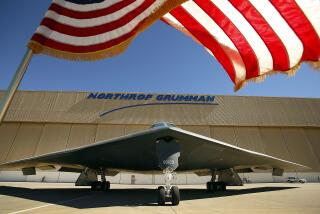Boeing May Sell Rocketdyne Unit
- Share via
Boeing Co. is close to selling its storied Rocketdyne rocket engine manufacturing business in the west San Fernando Valley to United Technologies Corp. in a deal potentially worth about $500 million, industry sources said Tuesday.
The sale of Rocketdyne, which helped pioneer space exploration in the 1960s, has been rumored as Boeing has struggled to turn a profit in the space launch business.
The possible sale to Hartford, Conn.-based United Technologies was first reported by the Wall Street Journal.
Boeing has been “shopping around” Rocketdyne for at least a year, the industry sources said, and United Technologies is believed to be the only suitor to have made a serious proposal.
The sources said a deal was imminent though one person close to Boeing stressed that the two sides were still working to settle on the terms. Among the possible stumbling blocks are environmental liability issues related to Rocketdyne’s Santa Susana rocket testing complex in the Simi Hills.
With headquarters in Canoga Park, Rocketdyne is perhaps best known as the maker of the main engines for the space shuttle. It has also developed a new generation of engines for military rockets known as Evolved Expendable Launch Vehicles, or EELVs, for the Air Force.
But it has seen its workforce steadily decline since the Apollo program ended in the mid-’70s. Once teeming with engineers and technicians toiling on various programs, the payroll has shrunk from more than 25,000 during the 1960s to barely 3,200 today.
The commercial satellite rocket launch business has been hobbled by a downturn in telecommunications dating to the dot-com bust in 2000, and Boeing’s overall rocket launch business has declined from two dozen annually to nine in 2004.
It is unclear whether United Technologies, if it were to go ahead with the purchase, would cut Rocketdyne’s workforce further.
Spokesmen for Boeing and United Technologies declined to comment.
Jon B. Kutler, president of aerospace investment bank Jefferies Quarterdeck in Los Angeles, noted that the U.S. rocket-making industry has been severely battered by a decreased demand for satellites and increased international competition from Japan, China and Europe.
“This is a sector that is overdue for consolidation,” Kutler said.
For United Technologies, acquiring Rocketdyne would help broaden the product line at its Pratt & Whitney unit, which in recent years has lost market share in its core jet engine business. Currently, United Technologies also makes smaller engines for multistage rockets, while Rocketdyne manufactures the main booster rockets.
The Air Force EELV, designed to send military satellites into space more reliably and cheaply, was seen as a possible comeback for Rocketdyne when Boeing initially won the lion’s share of EELV orders.
Then a former Boeing rocket program manager was charged with stealing trade secrets from competitor Lockheed Martin Corp. during the bidding process. The Air Force, after finding out about the pilfering of documents, took away about $1 billion of rocket orders and suspended Boeing from future rocket work.
Boeing in December announced that it would shutter one of its two Rocketdyne plants in Canoga Park by 2010, when the space shuttle is scheduled to be retired from service. Boeing last year began moving workers from its 47-acre facility adjacent to the Westfield Topanga shopping mall to a larger facility a few miles away on DeSoto Avenue. The site will be put up for sale when the move is complete.
Shares of Chicago-based Boeing rose 44 cents Tuesday to $51.04. United Technologies fell 66 cents to $100.02. Both are traded on the New York Stock Exchange.
More to Read
Inside the business of entertainment
The Wide Shot brings you news, analysis and insights on everything from streaming wars to production — and what it all means for the future.
You may occasionally receive promotional content from the Los Angeles Times.










